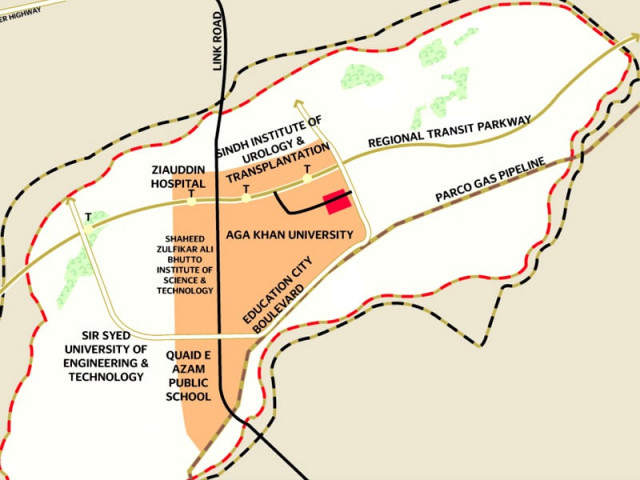Sindh eyes more education cities even though Karachi’s still not developed
A board headed by the CM will be able to allot lands.

The map above shows the land allotted to various universities in the proposed 8,900 km Education City. However, lack of infrastructure seems to be the major hurdle faced by universities as they contemplate establishing their campuses. PHOTO: FILE
The project has been talked about since 2001 and 8,900 acres off the Super Highway have been partly allotted. But many a deadline has passed and no university has actually opened its doors there. “Aga Khan, SZABIST, Sindh Madrasatul Islam, Aligarh Institute of Technology and other universities have got the land,” remarked Syed Sardar Ahmed of the Muttahida Qaumi Movement, “but the government has not yet provided infrastructure so that they can start development properly.”
The vice chancellor of Ziauddin University, Professor Dr. Pirzada Qasim, told The Express Tribune separately on Thursday that while the bill was a good sign, the government has done nothing to develop the education city. Soon after the land was allotted to private universities the Aga Khan University set up a boundary wall around its plot and SIUT began its primary health care centre, but a majority of the other institutions have not established their campus and hostels given that there was no infrastructure like roads, electricity, water and sanitation. “Our university also has a plot, but cannot start construction,” he said. “It would have been better if the government had developed this city, before announcing the same project in other districts.”
Perhaps matters will move forward now. A board will be chaired by the chief minister which will be able to allot land for private and public universities in every district for education city, said Sindh Law Minister Ayaz Soomro who moved the bill.
The board will consist of the secretaries of investment, local government, education, finance, health and land unitisation. Two elected representatives of the area will be appointed as members by the Sindh Assembly speaker. The board’s job will be to provide strategic vision and set policy. It will also control and supervise land allotment and land use. It will be able to grant land or give it on 99-year leases and decided when to renew or cancel them.
“The board may allot the land to the permit holder if they pay fifty per cent of the market price,” said Soomro. However, 10 per cent of compulsory free education will be given to deserving students from the area. The board also has immunity from legal prosecution.
Sindh Education Foundation funding
The finance department’s decision to plug funding to the Sindh Education Foundation was brought up by Marvi Rashdi of Pakistan Muslim League-F. The foundation runs 1,500 schools in Sindh but its employees are protesting because they haven’t been paid in violation of the chief minister’s orders. “Around 250,000 students are enrolled in the schools where 8,000 teachers are appointed,” she said. “This is not an issue of only these teachers, but 8,000 families would also suffer because of the finance department’s negligence.”
Speaker Nisar Ahmed Khuhro remarked that the Sindh Education Foundation was set up during the second tenure of Benazir Bhutto and the government would not let anyone shut the schools. He directed the law minister to look into the matter and report back.
On another note, minority MPA Saleem Khursheed Khokhar said that the Sindh government was trying to declare compulsory education in the Holy Quran from classes 4 to 10 in public and private schools. He demanded that it should be made mandatory for minority students to be taught about their religions. The law minister assured Khokhar that there would be no discrimination.
Speaker Nisar Ahmed Khuhro adjourned the session to meet in the afternoon for an in-camera briefing from the inspector general of police on law and order.
Published in The Express Tribune, February 15th, 2013.



















COMMENTS
Comments are moderated and generally will be posted if they are on-topic and not abusive.
For more information, please see our Comments FAQ